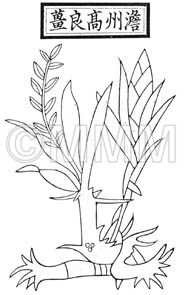Crude drug sample data base
※Click on the image to enlarge it.
The capital city, provincial capital city or the representative
location of its administrative area is indicated.
location of its administrative area is indicated.
Production area information
People's Republic of China
https://ethmed.toyama-wakan.net/img/pin_san.png
34.6937378
135.50216509999996
Collection information
Japan,Osaka Pref.
https://ethmed.toyama-wakan.net/img/pin_nyu.png
Scientific information data base
| Common name | 良姜, Liangjiang, Alpiniae Officinarum Rhizoma (JP18), (CP2020), Alpiniae Officinarum Rhizome (JP18), Lesser Galangal Rhizome (CP2020) | |||||
|---|---|---|---|---|---|---|
| Synonyms | 高良姜 (Gaoliangjiang) | |||||
| crude drug image |
| |||||
| Original plant name | Alpinia officinarum Hance | |||||
| original plant image |
| |||||
| Family name | Zingiberaceae | |||||
| Used part | rhizome | |||||
| Official compendium | JP XVIII, CP (2020 ed.) | |||||
| Clinical application | As an aromatic-stomachic, sedative and anti-nauseant, it is applied to treat stomach pain by cold, indigestion, nausea, abdominal pain and diarrhea. | |||||
| Medical system | Traditional Chinese medicine | |||||
| Drug effect in traditional medicine | Traditional classification | Drugs for dispelling internal cold | ||||
| Beneficial effect | [Property and Flavor] Hot; pungent. [Meridian Tropism] Spleen and stomach meridians meridians. [Actions] To warm the stomach to check vomiting, dissipate cold and relieve pain. [Indications] Cold pain in the epigastrium and abdomen, vomiting caused by stomach cold, belching and acid regurgitation. | |||||
| Chemical constituent | Monoterpenoids (*C1): 1,8-Cineole (= Eucalyptol) Sesquiterpenoids (*C1): alpha-Cadinene Phenylpropanoids (*C1): Methyl cinnamate Flavones & Flavonols (*C1): Galangin, Kaempferid, Alpinin | |||||
| Chemical structure |
※画像をクリックすると、拡大して表示されます。 | |||||
| Pharmacological effect | Water extract: antibacterial activity, inhibition of platelet aggregation, suppression of gastrointestinal motility, anti-ulcer activity. (C2) Diethyl ether extract: anti-ulcer activity. (C2) | |||||
| DNA sequence | AB040213, AF192711, AF192712, AF192709,AF192710 | |||||
| Classical reference (Chinese Herbal Classic "Zhenglei bencao") |  ※Click this image to see the actual image ※Click this image to see the actual image | |||||
| Disease | Pain due to abdominal coldness, Lower abdominal pain, Nausea, Vomitting, Hiccup | |||||
| Formulation | Anchusan, Chokoshiteito, Ryokito | |||||
| References | (JP18): The 18th edition of the Japanese Pharmacopoeia. (CP2020): Pharmacopoeia of the People's Republic of China 2020 edi. C1) The Encyclopedia of Wakan-Yaku with Color Pictures Vol. I, pp 136-137. C2) Parter Shoyakugaku, p 356. | |||||
| Remarks | Liangjiang is an ingredient for domestic medicines as well. | |||||
| Last renewal date | 2021/09/23 | |||||












